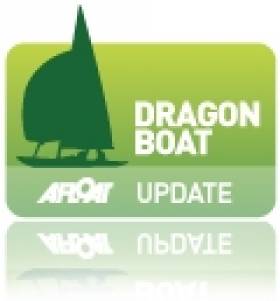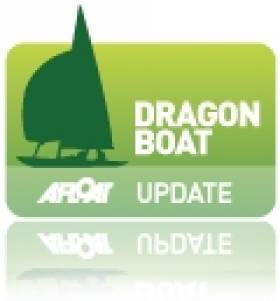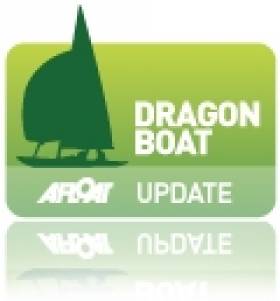Displaying items by tag: Lawrie Smith
Lawrie Smith Of Glandore Harbour Yacht Club is Britain's Sailor of the Year
Afloat.ie may have got there first by naming Lawrie Smith, the Master of Tralong and enthusiastic member of Glandore Harbour YC, as one of our "Sailors of the Month" for September 2023 after he'd won the Dragon Gold Cup as just the latest of many prestigious international trophies going back for decades.
But now, in the Yachting Journalists Association Yachtsman of the Year 2023 category in Britain, YJA members voted at the weekend "for a household name in the world of yachting, but one that has never graced this prestigious trophy before. At 67 years old, Lawrie Smith is an accomplished Olympian, America's Cup skipper, participated in four editions of the Whitbread Race, and is a UK National Champion in multiple classes.
"In 2023, however, he had an exceptional run of success, winning the 75th Edinburgh Cup and the Yanmar Dragon Gold Cup. He is presently competing overseas, and so Andrew Moss, Chairman of the British Dragon Class Association received the famous trophy on his behalf, and said, "Lawrie's skill in being able to sail a Dragon fast, together with the technical capability of the boat, he just has this magical ability to combine these together which led to him winning both of these incredibly challenging events, so well done to him and for this fantastic recognition'.
Early in the 1960s, Sid Smith – a builder and developer from Bury near Manchester – secured the site for the modest holiday home of his dreams beside the harbour in Glandore in West Cork. Summers in Glandore with much sailing for his young son Lawrie, became an essential element in Smith family life, and though Lawrie went on to a stratospheric career in international sailing, whenever possible, he has listed Glandore Harbour Yacht Club as his home base. Thus, in September 2023, thanks to Lawrie, the Dragon Gold Cup – the class’s supreme prize – was added to Glandore’s trophy haul.
It was a particularly timely outcome with the 2024 Gold Cup scheduled for Kinsale. And with autumn rapidly advancing, we are reminded that the Smiths were so fond of Glandore that they were among the families who spent Christmas and New Year there, with Sid Smith’s authentic rendition of Ilkley Moor a midwinter party favourite.
#dragonsailing – Lawrie Smith showed his mettle to take the 2014 Irish Dragon Nationals at Kinsale YC today writes Claire Bateman. Britian's Smith with crew Adam Bowers and Jack Wilson and sailing under the Burgee of the Glandore Harbour Yacht Club won today's two races to take the title on a day when the wind never went above 8 knots from the south east. It was a close run thing with two other boats on similar points and it went to a tie break to decide the winner. Neil Hegarty's Phantom with crew David and Peter Bowring from RStGYC were second and first Corinthian entrants. Martin Payne and crew Dominic and Olivia Bakker in Little Hooka from Salcombe Yacht Club were third overall.
Due to lack of wind no racing took place on Friday. An early start was made on Saturday in an attempt to get in three races but this was not to be and two races were sailed in a breeze of about six knots. A patient Race Committee waited about an hour after the second race to watch an approaching shower in the hope there would be some wind following but this did not happen and racing finished for the day. However that being said six of the seven races scheduled for the event were sailed.
Results HERE.
#dragons – On driving to Kinsale yesterday to photograph the 2014 Irish Dragon Nationals it was a miserable outlook with the rain thundering down in quantities not experienced for some months writes Claire Bateman. Even while waiting around in Kinsale the rain was still incessant. However, some thirty minutes later it was as if a miracle had occurred, the rain ceased, the clouds disappeared and the sun shone gloriously. The wind filled in from a different direction going from south easterly of some 15 knots with a lumpy sea to west/south west 12 knots.
With the marks re-laid on the windward/leeward course Race Officer Alan Crosbie got the race underway for the twenty one boat fleet of which ten are Irish and the remainder of the fleet are visitors from outside the country.
In Race two leading the fleet was Neil Hegarty, David Williams and Peter Bowring from the RStGYC sailing Phantom and, trying to make amends for a poor 15th in the first race, did just that by taking the winning gun. From the Kinsale team, a consistent result in both races was achieved by Cameron Good, Simon Furney and Henry Kingston sailing 'Little Fella'. They had a second in the first race and third in the second race. This result has now placed them at the top of the leader board. Following 'Little Fella' and second on the leader board is the wily fox from the RStGYC, Andrew Craig, sailing with Brian Mathews and Mark Pettit counting a first and a sixth.
The fleet is very strong and includes two former Olympians Robin Hennessy. who sailed in the 1972 Olympics in Kiel, sailing Aphrodite with John Wolfe and John O"Connor, sailing under the burgee of the Royal Palma Yacht Club. Making a welcome return to Kinsale is the second Olympian and Round the World Sailor Lawrie Smith with Adam Bowers and Jack Wilson.
The seven race series will continue until Sunday.
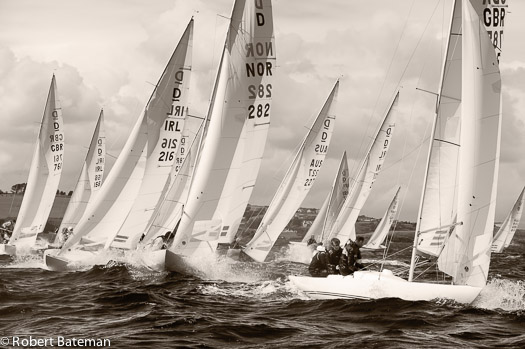
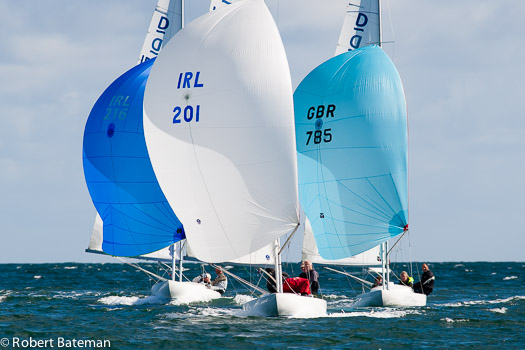
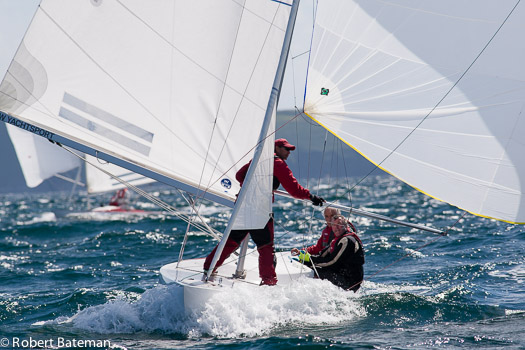
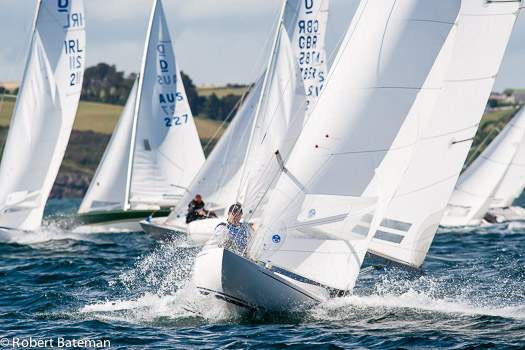
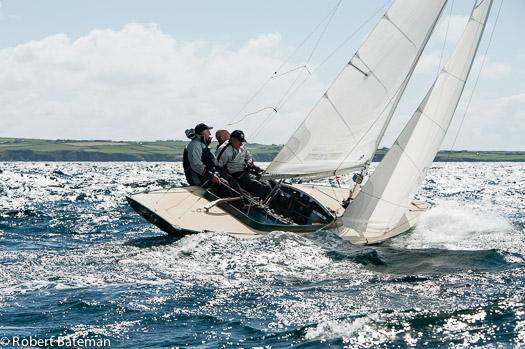
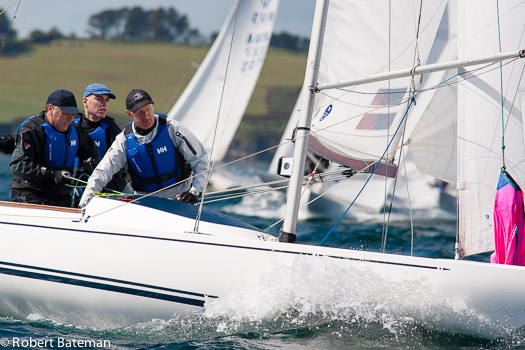
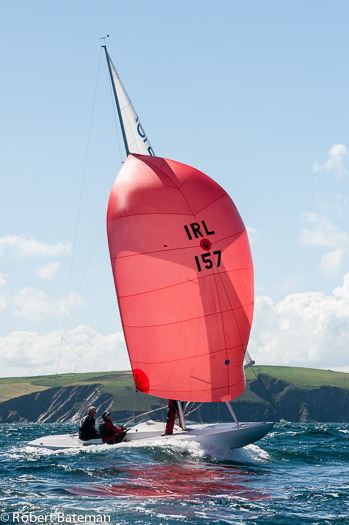
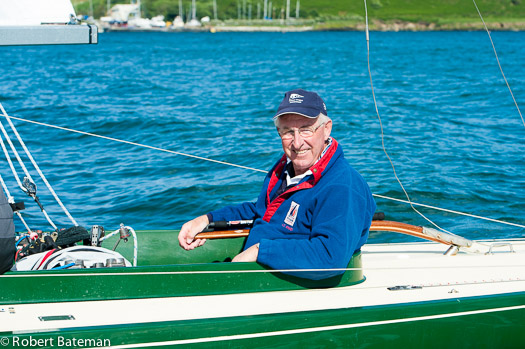
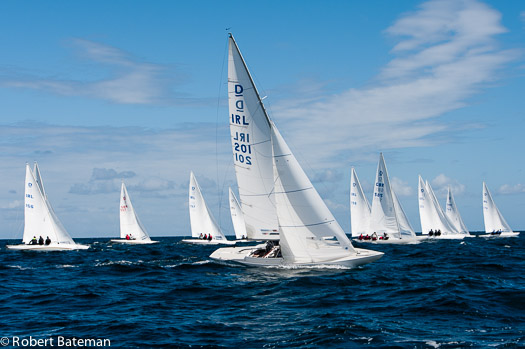
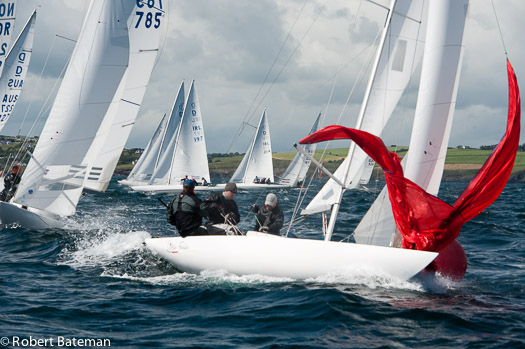
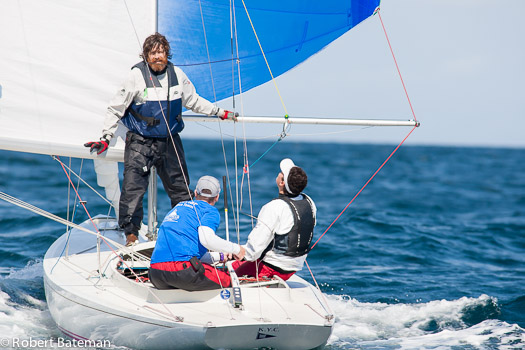
Ireland's Dragon Team ends World Championships in Top Half
Dun Laoghaire trio Andrew Craig, Mark Pettit and Brian Mathews finished in the top half of the 70-boat Melbourne based Dragon World Championships at Port Philip yesterday after a six race series of predominantly light winds.
Hopes of bettering Ireland's best ever result at a Dragon Worlds, a fourth place overall, achieved by Craig in Tasmania in 2003, were dashed with a string of mid fleet results. The Irish crews best finish was tenth in a highly competitive fleet to be 26th overall. RESULTS HERE.
The event was won by Brtiain's Lawrie Smith who has not sailed since his Last Volvo Ocean Race campaign in 1999. "This really is such a joyous way to come back. I honestly did not think we'd get the win. Then again, I also thought it was going to blow 25 knots each day!" said Smith at the prizegiving.



























